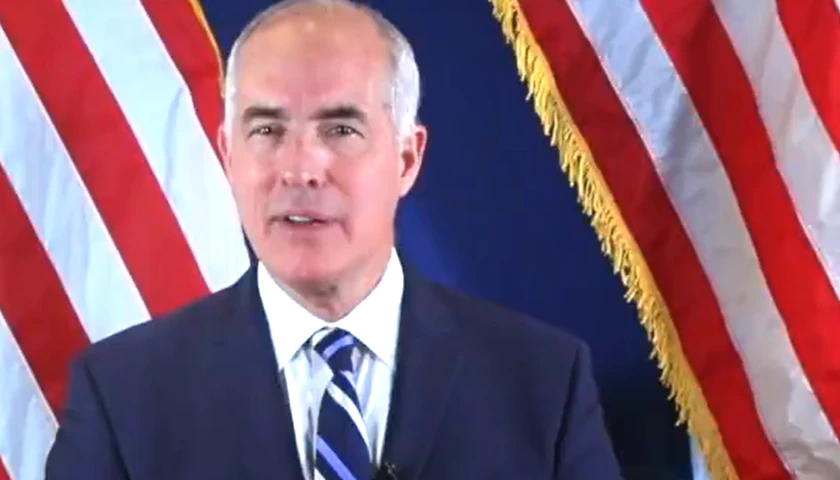The Office of the State Inspector General (OSIG) has released reports substantiating multiple allegations that the Virginia Parole Board (VPB) violated state statutes as well as its own policies and procedures after investigating complaints regarding the parole of specific Department of Corrections offenders.
On Tuesday, the OSIG released copies of the reports, originally sent to Governor Ralph Northam’s administration, to media outlets who requested them that were mostly redacted and did not offer the specific findings of the investigation into the VPB.
On the same day, Senate Minority Leader Thomas Norment (R-James City County) and House Minority Leader Todd Gilbert (R-Shenandoah) published a joint statement calling for the State Inspector General, Michael Westfall, to provide the unredacted copies as required by Virginia law.
“The Office of State Inspector General must provide legislative leaders with unredacted copies of these reports,” Gilbert said in the statement. “Until they do so, they are not in compliance with the law. We will be making this clear to the Inspector General, in court if necessary.”
The Virginia Star obtained copies of two letters sent by the Inspector General to the Northam administration.
One was addressed to Clark Mercer, the governor’s chief of staff, dated October 6, and provides a broad summary of the substantiated allegations against the VPB.
The other was addressed to Brian Moran, the governor’s secretary of public safety and homeland security, dated September 18, detailing recommendations for the VPB based on the findings of the investigation.
According to the summary letter to Mercer, the OSIG substantiated five out of seven allegations that the VPB did not give notifications of offenders’ pending parole to Commonwealth Attorneys (CA) within the allotted statutory timeframe, which says notice must be sent to the CA in the jurisdiction the inmate was sentenced by certified mail at least 21 business days before the release on a prisoner convicted of a felony and sentenced to ten or more years.
The OSIG also substantiated all seven allegations that the VPB did not “endeavor diligently” to contact victims prior to making decisions on granting discretionary parole to offenders, as required by Virginia Code § 53.1-155, according to the summary letter.
Additionally, the OSIG found an allegation that the VPB released an offender on parole after that person only served one-third of his or her sentence to be accurate, according to the summary letter.
These findings are especially problematic for the victims of crimes and the families of victims.
“I have heard from some citizens and they are horrified,” Norment said in an interview with The Star. “In some instances, the traumatic impact does not completely heal with the passage of time. Many of these victims are suffering from a form of post-traumatic stress disorder (PTSD), and just because someone has been convicted and incarcerated does not mean that the vivid recollection of what took place has totally been eradicated from their mind.
“And the potentiality of seeing your criminal in public, on the street, not knowing they’re there is going to trigger that PTSD.”
There have been multiple examples of victims or their families not being properly notified of an offender’s release by the VPB.
One such instance occurred back in March of this year when a Associated Press reporter was the first person to notify Juanita Gillis that the man who shot her brother in 1993 had been granted parole by the VPB.
“I mean, good grief. What, they were never going to tell us and here we are thinking this killer is still in jail?” Gillis told the AP.
Chuck Smith, a retired U.S. Marine and Republican candidate for Virginia Attorney General in 2021, criticized the VPB’s actions.
“When you have a violent offender that is going to be released into the community, the parole board, ergo the state government, should show more concern for the citizens, the victims, more concern for the community then they are about the individual being released to the extent that they notify people before that release takes place,” Smith told The Star.
According to the letter to Moran, the OSIG made a total of ten recommendations on how the VPB should operate going forward. One recommendation stated that the parole board should develop and follow a code of ethics which focuses on impartiality, integrity and transparency when making parole-related decisions.
The complaints leveled at the VPB were made through the State Fraud, Waste and Abuse Hotline.
During the Senate session Wednesday afternoon, Sen. Mark Obenshain (R-Rockingham) gave a passionate speech to the body on the OSIG redacted reports and the allegations of wrongdoings by the VPB.
“I believe that the governor needs to fire this parole board, replace every single one of them,” Obenshain said. “I think that the Inspector General needs to do his job impartially, provide the reports that he is required to provide by law and the Governor needs to step up and ensure that it takes place.”
Two Senate bills that would have brought greater transparency to the individual votes of parole board members and to the criminal history of offenders released on parole were killed by the Virginia House of Delegates Committee on Courts of Justice earlier in the 2020 special session.
– – –
Jacob Taylor is a reporter at The Virginia Star and the Star News Digital Network. Follow Jacob on Twitter. Email tips to [email protected].
Background Photo “Virginia Capitol” by Martin Kraft. CC BY-SA 3.0.





